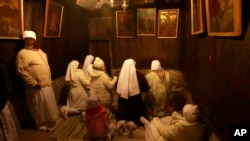Every year, thousands of Nigerians travel overseas on religious pilgrimages: Muslims head to Mecca, while Christians go to Jerusalem.
Under previous administrations, Nigeria’s federal governments paid for these pilgrimages. But the new administration of Muhammadu Buhari announced it will stop paying for these trips.
The government of Kaduna state in the country’s north will follow suit, spokesman Samuel Aruwan said.
“From now on, there will be nothing like sponsoring key government officials or even the general public to either go to Jerusalem or to go to Mecca," Aruwan said.
The pilgrims are not being entirely cut off.
Some aid allowed
Federal government spokesman Femi Adesina said pilgrims will be allowed to buy foreign currency at a preferential exchange rate, while Aruwan said Kaduna will send people to help pilgrims with safety and logistics.
While some have lauded the move as a cost-saving measure, the move has rattled some in Nigeria, where prayer and displays of devotion are important parts of public life.
Yohanna Buru, the general overseer of a church in Kaduna, said, “It is the duty of the government, at least, to give that support to those who really would have remained necessary to them. Because that’ll increase their faith, that’ll also help them to pray for this nation, that will help them to pray for the unity of this country, and for the success of every governor that comes on.”
But others, like Kaduna resident Zayyad Aliyu, said they never benefited from the money allocated for these pilgrimages. Aliyu said the government should spend its money elsewhere.
“All this type of extra spending is not going for the masses. It’s more for the wealthiest," he said.
Nigeria, Africa’s most populous country, has a population of about 173 million, which is nearly equally divided between Muslims and Christians.








